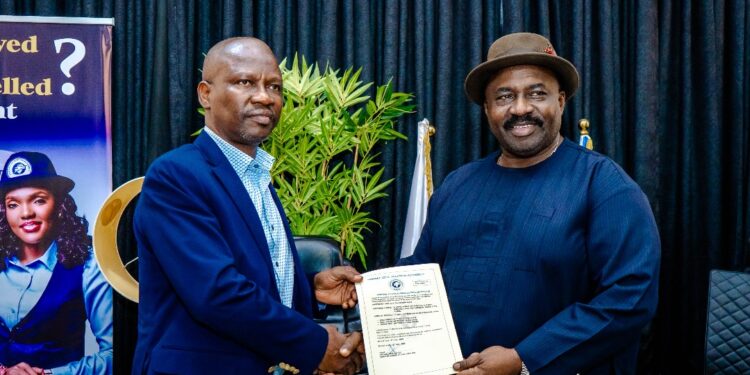The Nigeria Civil Aviation Authority (NCAA) has presented a certificate to Arco Aviation Academy, officially granting it the licence to train drone pilots in the country and also support the regulation of drone operations nationwide. This development is seen as a major step forward in building local capacity in drone technology, a growing area of focus in Nigeria and around the world.
The Director-General of NCAA, Captain Chris Najomo, presented the certificate to the Managing Director of Arco Aviation Worldwide Services, Mr. Okosubide Mozimo, during an official event. While handing over the document, Captain Najomo tasked Arco Aviation not only to train drone operators but to act as a key player in monitoring and regulating drone activities across the country.
He noted that drones are becoming widely used globally for several purposes, and Nigeria must catch up. Najomo said the NCAA recognised the growing use of unmanned aerial vehicles (UAVs) and the need for skilled operators. He pointed out that Nigeria lacks enough trained professionals in this field, and this certification will help solve that problem.
According to him, “Drone technology is becoming popular globally, and with the proliferation of drones in Nigeria, it is important that you become the eyes and the ears of NCAA. Drones are the way to go, given the critical roles they now play in many areas of human activities. This is a new beginning and a pioneering step. The certificate we’re giving you is not just a recognition, it’s a call to maintain high standards.”
He stressed that keeping the licence would require Arco Aviation Academy to strictly follow NCAA rules. He also said the Authority will continue to monitor the academy’s activities to ensure full compliance with safety and training guidelines.
In his remarks, Mr. Okosubide Mozimo, the Managing Director of Arco Aviation, expressed happiness over the achievement. He explained that the academy had been working for many years to reach this point and that the certification would reduce capital flight for aviation training. Mozimo revealed that the company used to send pilots abroad to countries like the United States, Dubai, and South Africa, where they spent up to $25,000 per person just for training.
He said, “There was a time we spent between $20,000 and $25,000 per pilot for training overseas, in the U.S., Dubai, South Africa. That meant dealing with forex instability, visa delays, and logistics. With this certification, all of that will now be done here in Nigeria, in Naira. This is a big win for our company, for the economy, and for the youth.”
Mozimo further disclosed that Arco Aviation has already logged over 9,500 hours of Beyond Visual Line of Sight (BVLOS) drone operations. Most of these were carried out to monitor oil and gas pipelines to prevent vandalism and theft. He said drones are already transforming sectors like security, energy, agriculture, and infrastructure globally, and Nigeria must not be left behind.
He stated that this approval aligns with a vision that started in 2016 and that Arco Aviation is committed to helping Nigeria become a leader in drone technology in Africa. He said the academy, which currently operates in Port Harcourt, will soon expand its training centres to Lagos and Abuja to make drone education more accessible to young Nigerians.
The approval makes Arco Aviation Academy the first drone pilot training institution in Nigeria to receive such certification from the NCAA. This signals the beginning of a new era in the country’s aviation sector, with the potential to create jobs, encourage innovation, and reduce Nigeria’s dependence on foreign training institutions.
Industry observers believe this move will also improve national security and reduce the financial burden on companies that rely on drones for surveillance and operational monitoring. It is expected that more institutions will follow this path, as the demand for drone pilots continues to grow.
The NCAA also confirmed that it will continue to introduce policies that support safe drone use, while helping to develop Nigeria’s aviation infrastructure in line with global trends. The Authority is encouraging more private sector participation in drone regulation and training as it builds a more robust aviation system.
This latest development is part of broader efforts by the federal government and aviation regulators to promote innovation and local content development in the country. By supporting training institutions like Arco Aviation Academy, the NCAA hopes to grow the country’s drone economy and open up more opportunities for Nigerian youths interested in the aviation and technology sectors.
